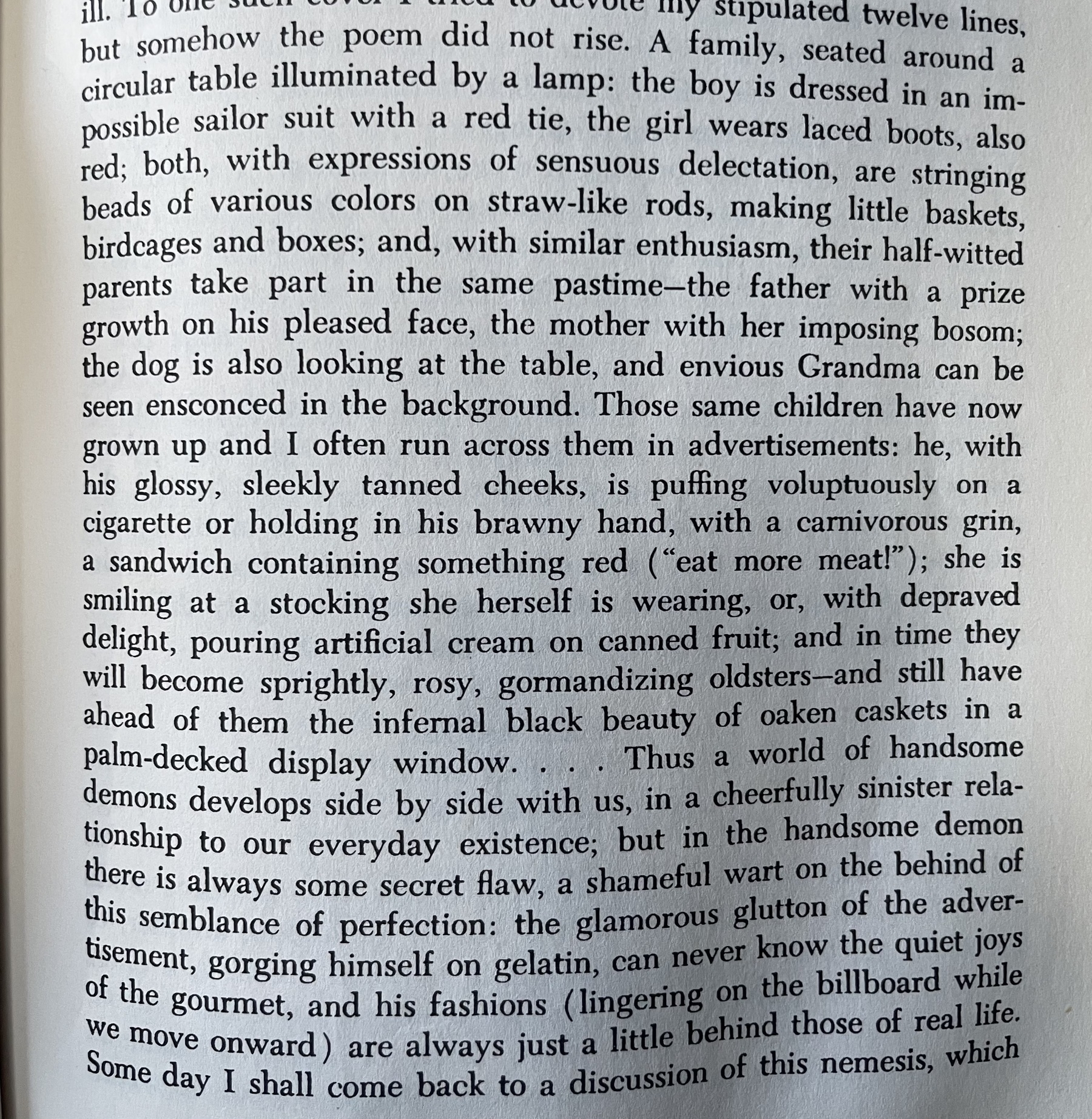


“The oddest feature of the 1552 rite is the disappearance of the corpse from it . . . At the moment of committal, the minister turns not towards the corpse, but away from it, to the living congregation around the grave.”
— Eamon Duffy, quoted in MacCulloch, Thomas Cranmer
“When we dote upon the Perfections and Beauties of some one Creature: we do not love that too much, but other things too little. Never was anything in this World loved too much, but many Things have been loved in a false Way: and all in too short a measure.”
— Traherne, Centuries
“Despite their respective compromises, Cranmer and Gardiner were now propelled into new and mutually antagonistic stances. Glyn Redworth has reminded us that the two men were to become joint and rival keepers of Henry VIII’s Janus-like conscience, Gardiner reflecting Henry’s hold on the past, Cranmer reflecting his efforts to reshape the future.”
— MacCulloch, Thomas Cranmer, 77
Nabokov, The Gift

“That’s called good training,” Tenumah said. “What you’re hearing is a human successfully smoothed into a corporate algorithm, conditioned to prioritize policy over people. If you leave humans in their natural state, they start to care about people and listen to nuance, and are less likely to follow the policy.”
quoted by Chris Colin in The Atlantic

Not an easy book to rate on a five-star scale.
Critics describe Madame Bovary as a perfect book, in the most specific sense: It is absolutely watertight and concrete. Every sentence is a Chekhov’s gun. Every small detail hums with significance. Somehow, this relentless symmetry adds up to a merciless, photorealistic clarity, which is odd when you think about it; real life isn’t this watertight. But Flaubert gives the impression of having seen and dissected one woman’s entire life and made sense of it, like a detective taking snapshots of a crime scene.
With this in mind, it’s fair to describe the novel as an astonishing technical achievement.
But exactly because Madame Bovary is a masterpiece of realism, it’s dreadfully depressing to read. Flaubert is convincing. He paints in minute detail an absolutely bleak world, a series of self-deceiving people bound together by relations of lust, greed, and boredom. And what’s hard is that this world looks so much like our world. It’s very, very plausible, and he’s detailed every dewdrop on every blade of grass.
I think, though I’m not sure, that within the world of the novel Madame Bovary’s self-destruction is inevitable. There seems to be nothing, and nobody, who could have formed her into a person who could love meaningfully or selflessly. Nobody in her world has that kind of character, and none of the communities she lives in produce anyone like that. I say that I’m not sure. I can imagine a reading of the novel where Charles could be noble, Tostes and Yonville could be redeemable, where Emma’s fate could be different.
To sum up: I hope Emma and everyone around her is wrong. I hope that when you pay attention to the world, see every flower on every oat-stalk and every bumbling country doctor, you find that you can look them into loveliness. I hope that even being bound to a dull community of foolish people could bring unexpected graces. I hope that reality has a richer romance than fantasy.

“Over the years [Elizabeth I] had sat ensconced in a web of poetry and romance, but money had always been the substance that had welded together the delicate structure.”
— Somerset, Elizabeth I
To test whether AI-generated ideas lead to better research outcomes, we conduct an execution study by recruiting 43 expert researchers to execute randomly-assigned ideas, either written by experts or generated by an LLM. … Comparing the review scores of the same ideas before and after execution, the scores of the LLM-generated ideas decrease significantly more than expert-written ideas on all evaluation metrics (novelty, excitement, effectiveness, and overall; p < 0.05), closing the gap between LLM and human ideas observed at the ideation stage.
Zvi notes correctly that this isn’t really about ideation versus execution, but about the challenges of evaluating whether a given idea will execute well:
What is actually happening here is that the AI ideas were never better than the human ideas. The AI ideas looked better at first, but that was because of errors in than [sic] human evaluation of the ideas. Execution revealed the truth. … Claude, for rather obvious reasons, was optimizing in large part on what would look good to an evaluator, rather than for ultimate results.
In Life of Chuck, Mike Flanagan makes solipsism about as tender and poignant as possible. It’s a joy for the sweetness and the dignity of its portrait of a middle-America accountant, and its lovely choreography.
But it doesn’t make its philosophy convincing enough for me. I think it does matter that the people we meet don’t live just in our own heads, but live and breathe independently of us, who can then be closely bound to us and become both familiar and strange. An ordinary accountant’s death is a great tragedy not because the world inside his head is lost, but because the world outside of his head loses him.
“So you are the Creator and Redeemer of the world: but what a small world it must be! What a little heaven you must inhabit, with angels no bigger than butterflies! How sad it must be to be God; and an inadequate God! Is there really no life fuller and no love more marvellous than yours; and is it really in your small and painful pity that all flesh must put its faith? How much happier you would be, how much more of you there would be, if the hammer of a higher God could smash your small cosmos, scattering the stars like spangles, and leave you in the open, free like other men to look up as well as down!”
And, of Donne. His rightly famous words invert Chuck’s solipsism:
No man is an island, entire of itself; every man is a piece of the continent, a part of the main. If a clod be washed away by the sea, Europe is the less, as well as if a promontory were, as well as if a manor of thy friend’s or of thine own were: any man’s death diminishes me, because I am involved in mankind, and therefore never send to know for whom the bells tolls; it tolls for thee.
The Pickwick Papers is a peculiar read. You come to the end and realize that the book you started has transmogrified into a different book under your nose. Chesterton summarizes: “Many critics have commented on the somewhat discordant and inartistic change between the earlier part of Pickwick and the later.”
But GKC has a crucial insight into what happens between the front and the back of Pickwick:
The strange and stirring discovery which Dickens made was this—that having chosen a fat old man of the middle classes as a good thing of which to make a butt, he found that a fat old man of the middle classes is the very best thing of which to make a romantic adventurer. “Pickwick” is supremely original in that it is the adventures of an old man. It is a fairy tale in which the victor is not the youngest of the three brothers, but one of the oldest of their uncles. The result is both noble and new and true …
Dickens, and Dickens only, discovered as he went on how fitted the fat old man was to rescue ladies, to defy tyrants, to dance, to leap, to experiment with life, to be a deus ex machinâ, and even a knight-errant. Dickens made this discovery. Dickens went into the Pickwick Club to scoff, and Dickens remained to pray.
Twenty years after GKC wrote this appreciation, another story about a fat old (well, middle-aged) man of the middle classes emerged:
“The Bagginses had lived in the neighborhood of The Hill for time out of mind and people considered them very respectable, not only because most of them were rich, but also because they never had any adventures or did anything unexpected…This is the story of how a Baggins had an adventure, and found himself doing and saying things altogether unexpected.”
Grown-up critics of The Hobbit have accused it of having a similarly “discordant and inartistic change” along the way. We move from what feels like a cheery nineteenth-century village to high fantasy in what feels like late antiquity — in other words, from Barchester Towers to Beowulf and back again!
But I think The Hobbit endures because it shares the deep insight of Pickwick, that the bumbling middle-aged gentleman who eats too much cake is mysteriously the right hero for an adventure story. Chesterton again:
His simple vanity and voracity, his innocent love of living, his ignorant love of learning, are things far fuller of romance than the weariness and foppishness of the sniggering cavaliers. When he consciously speaks prose, he unconsciously thinks poetry. … With torches and trumpets, like a guest, the greenhorn is taken in by Life. And the sceptic is cast out by it.
Death:
“Death, thou wast once an uncouth hideous thing,
Nothing but bones,
The sad effect of sadder groans:
Thy mouth was open, but thou couldst not sing.
…
But since our Saviour’s death did put some blood
Into thy face,
Thou art grown fair and full of grace,
Much in request, much sought for, as a good.”
Time:
Christ’s coming hath made man thy debtor,
Since by thy cutting he grows better.
And in his blessing thou art blest:
For where thou only wert before
An executioner at best;
Thou art a gardener now, and more,
An usher to convey our souls
Beyond the utmost stars and poles.
I like Herbert’s sympathy here for his anthropomorphized Death and Time. In his vision, it’s not only people who get saved by Christ’s coming.
Maybe Boethius and I want the same thing.
“A working landscape was transformed into a national park, in just one of the curious epiphenomena of refrigeration … The river of dead meat flowing into Britain stimulated a countercurrent in live humans, as former farmers emigrated.”
Nicola Twilley, Frostbite, 81
“All that is constant about the California of my childhood is the rate at which it disappears.”
Didion, “Notes from a Native Daughter”
Il faut souffrir pour être belle…To be born as blonde and blue-eyed and beautiful as she was can be as much of a handicap in its way as to be born with a cleft palate because if you are beautiful enough you don’t really have to be anything much else to make people love you and want to be near you.
– Buechner, Telling Secrets, 15
Hearts are not had as a gift but hearts are earned
By those that are not entirely beautiful…
— Yeats, Prayer for My Daughter
And now Psyche must go down into the dead-lands to get beauty in a casket from the Queen of the Deadlands, from death herself; and bring it back to give it to Ungit so that Ungit will become beautiful…
*
Two figures, reflections, their feet to Psyche’s feet and mine, stood head downward in the water. But whose were they? Two Psyches, the one clothed, the other naked? Yes, both Psyches, both beautiful (if that mattered now) beyond all imagining, yet not exactly the same. “You also are Psyche,” came a great voice.
— Lewis, Till We Have Faces
“There are so many evidences of the immortality of the soul, even to a natural man’s reason, that it required not an article of the creed, to fix this notion of the immortality of the soul.
But the resurrection of the body is discernible by no other light, but that of faith, nor could be fixed by any less assurance than an article of the creed. Where be all the splinters of that bone, which a shot hath shivered and scattered in the air? Where be all the atoms of that flesh, which a corrosive hath eat away, or a consumption hath breathed, and exhaled away from our arms, and other limbs? In what wrinkle, in what furrow, in what bowel of the earth, lie all the grains of the ashes of a body burnt a thousand years since? In what corner, in what ventricle of the sea, lies all the jelly of a body drowned in the general flood? what coherence, what sympathy, what dependence maintains any relation, any correspondence, between that arm which was lost in Europe, and that leg, that was lost in Africa or Asia, scores of years between?
One humour of our dead body produces worms, and those worms suck and exhaust all other humour, and then all dies, and all dries, and moulders into dust, and that dust is blown into the river, and that puddled water tumbled into the sea, and that ebbs and flows in infinite revolutions,
and still, still God knows in what cabinet every seed-pearl lies, in what part of the world every grain of every man’s dust lies; and sibilat populum suum, (as his prophet speaks in another case) he whispers, he hisses, he beckons for the bodies of his saints, and in the twinkling of an eye, that body that was scattered over all the elements, is sat down at the right hand of God, in a glorious resurrection.”
— John Donne, Sermon LXXXI, setting the highest possible standard for wedding sermons
“But I do not want you to think that I am waging relentless war against Fortune. There is a time when that deceitful goddess deserves respect from mortals: I mean, at the time when she reveals herself, when she takes off her mask and makes her habits plain.”
—Consolation 8
From Donne:
”As with bodily disease, so also in spiritual disease the state of speechelessness is the most desperate.”
The tragedy of Lear is precisely not nihilistic. It consists of the moral order reacting to a moral outrage: a kind of allergic reaction from the just world to great injustice.
There is an asymmetry of injustice: The innocent receive punishment that they surely don’t deserve. But no guilty one goes unpunished. “All friends shall taste the wages of their virtue and all foes / the cup of their deservings,” says Albany. And he is, strangely, not wrong.
Whatever gods rule Albion, they by no means clear the guilty. Inexorably the agents of wickedness die by poison, by treachery, and by a fair fight.
The Lear we meet in Act 1, Scene 1, has become the kind of man who deserves the worst.
We can glimpse from Kent, Albany, and Cordelia that perhaps Lear was not always like this. He is worthy of some intrinsic loyalty as a king, a venerable old man, and yet surely also he must have had some real nobility that makes him worthy of such a love. But his behavior to Cordelia betrays not only a present madness, but a deep corruption of his soul: a pride that has devoured him and has caused him to do the worst thing a father can possibly do.
(A father should love his daughter without condition, no matter how wicked she is; this father denounces his daughter because she will not love him without condition—which shows him to be wicked.)
In a just world, it is of course a problem that a man like Lear should exist. But granting that such a man exists, what should we expect but utter destruction? What should we expect from a family with such a father?
Steadily, the moral universe responds to Lear’s offense in outrage. His elder daughters betray and belittle him; what else should become of such a father? Lear’s punishment is most strict and correct. The father who devours his daughters is in turn devoured by them. He loses his crown, is beset by madness, loses the whole world. The whole corrupt family, the whole dreadful crew, is devoured by bloodshed.
Not to mourn the profound suffering of this play would be inhuman. But without adopting an unholy chipperness, we can, I think, be surprised that the play’s tragic outcome is by no means the worst possible.
While the righteous ones are grievously hurt, the wicked do not prosper. There is a properly nihilist version of this play in which Edmund kills the king and his family, usurps the throne, and lives happily ever after with whatever sister he decides not to murder. But this is not what Shakespeare writes. In his version, the guilty get what they deserve. Except —
What does Lear deserve?
Certainly not Cordelia.
(Regan and Goneril make sense. For a father like Lear to have such daughters is within the order of things.)
It is the expected and right outcome for Lear’s sin to beget sin. Lear’s wickedness must as a matter of course kill his daughters and his sons and his friends, because evil begets evil. The whole court should perish in madness, be consumed by fire, be turned to pillars of salt.
But it is not, because one righteous daughter is found. And one, nay, two, righteous advisors are found. And there is a righteous son, a son who loves his blind father well. These happy few do not bend the knee to Baal; they disrupt the inexorable march of justice; they shine like stars in a cruel and corrupt world. How extraordinary are these good ones! Why would we marvel at the cruel father and his cruel daughters? We should instead be caught in astonishment by the strange few who can love. The miracle is that all is not lost.
And so something begins to happen. Lear begins to receive a portion of what he has deserved, and yet, by what I think must only be divine grace, he also receives something he does not deserve.
The Fool, Cordelia, Edgar, and Kent love Lear with a pure and steadfast love, and when he loses his crown and his wits and his health, something changes.
Lear is changed. He turns around. He asks his daughter’s forgiveness and is forgiven. He offers to love her. This man who threatened his daughter with death then dies in her defense. Who is this man? He is not the man from Act One. He is a man capable of selfless love, a man whose pride has vanished, a man whose broken and contrite heart enables him to at last be a father to his daughter.
This is not cheap grace. It is the costliest kind I can imagine. But I think it must be salvation. There is no earthly reason that this man of cruelty and bitterness should become a man of love.
I think there is no other way to understand Lear’s story than that the man we saw at the beginning has been crucified, has fallen to the ground and died. And while the kingdom of Albion has been stained dreadfully with blood, there is nonetheless fruit unlooked-for rising from the seed. “What comfort to this great decay may come / Shall be applied.” Two righteous men remain to rule and restore.
Albion is saved by a pinch, saved as if through fire, like its sinning king.
Lear’s heart of stone has been changed for a heart of flesh.
But I think this is why King Lear has to be a tragedy: The awful privilege of a heart of flesh is that it can break. Lear’s crime is a type of the human crime: human sin is too great to have no consequences. Its burden is placed, with deep injustice, on an innocent, a Lamb.
At last, Lear sees himself with clear eyes. “You do me wrong to take me out o’ the grave. / Thou art a soul in bliss; but I am bound / Upon a wheel of fire, that mine own tears / Do scald like molten lead.” This is the hell Lear deserves.
Well. Treat every man as he deserves, and who shall escape whipping?
I think we can hope that Lear does not get what he deserves. I think we can hope that the daughter he does not deserve brings him, with her, to the bliss that he does not deserve.
Lear has lost the whole world. By God’s grace, by the grace of his daughter, by the foolish upside-down absurdity of a love that will not let him go, he may have gained his soul.
“Nothing in Hamlet goes according to plan, but everything happens by significant accident when the time is ripe.”
—Philip Brockbank, quoted in Tony Tanner, “Introduction,” The Major Tragedies
All holds. For we are strong and skilled; we have authority; we hold memory of evil; we are stern, nor can men’s pleadings bend us. We accomplish our duties, spurned, outcast from gods, standing apart in slime unlit by the sun. Rocky and rough are the paths for those who see and alike for those whose eyes are lost.
— Eumenides, 381-388
Imagine a man who gave a banquet feast and invited to it the halt, the blind, cripples, and beggars. Now far be it from me to believe anything else about the world than that it would find this beautiful even though eccentric. But imagine that this man who gave the feast had a friend to whom he said, “Yesterday I gave a great feast!” Is it not true that the friend would first and foremost wonder that he had not been among those invited? But when he found out who the guests had been — now, far be it from me to believe anything else about this friend that he would find it beautiful even though eccentric. Yet he would wonder and would perhaps say, “It is a strange use of language to call such a gathering a feast…”
— Kierkegaard, Works of Love